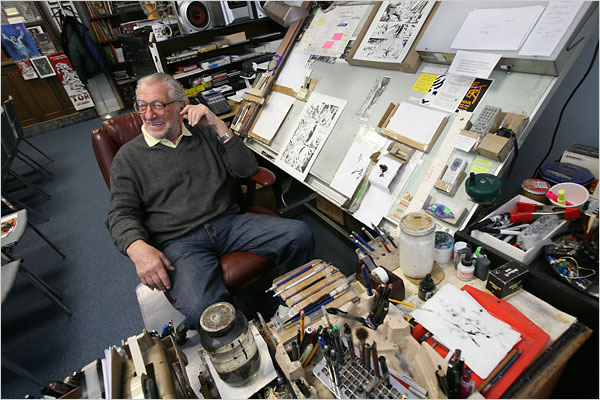Joe Kubert has passed away at age 85. The legendary cartoonist broke into the industry in 1938 before his twelfth birthday and has worked ever since. Kubert, who’s name became synonymous with war comics co-created Sergeant Rock, Tor, Ragman, and Viking Prince. In addition to notable runs on Hawkman and Tarzan, Kubert also wrote and illustrated several original graphic novels including Yossel: April 19, 1943, Fax from Sarajevo and Jew Gangster. Kubert also founded the The Kubert School in 1976 and sons, Andy and Adam Kubert followed Joe into the comic book industry where they are notable artists.
But, I wanted to tell you about the Joe Kubert I encountered on Sunday May 1, 2011.
My father had passed away a few months earlier at the end of February and I had decided to attend the Boston Comic Con, in no small part to see a few friends and just get away for the weekend. I was covering the event as press and I had inquired to the folks running the show if they needed any of the panels moderated. They got back to me with an email I wasn’t quite expecting:
Joe Kubert needs a moderator. I’m waiting to hear back as to whether or not the Kubert School rep wants to moderate. If not, the job is yours if you want it.
Of course I wanted to! The fact that this was my first time moderating a panel and being asked to do so with a legend who’s work I admire made the task all the more daunting.
I was put in touch with Gabe Bridwell, who was an enormous help in terms of advising what Mr. Kubert was interested in talking about. I spent hours reading every interview I could find with him as well as researching various facts; the more obscure the better, hoping to get him to talk about things he might not regularly discuss.
Fast forward to Saturday, April 31st. The Boston Comic Con was packed, and was in an interesting year of transitional growth. Among the guests at this particular show were Adam Hughes, J. Scott Campbell, Art Adams, Frank Quitely, Darwyn Cooke, Dave Johnson, Matt Wagner, Tony Harris, Frank Cho and many other notables.
I attended several panels, from disorganized (reminding me what not to do as a moderator), to surreal (Mark Chiarello moderated a hysterically funny Howard Chaykin panel with less than a dozen attendees).
I walked over to the Kubert School booth and introduced myself to Mr. Kubert, who seemed to be taking the whole show in from his vantage point.
“I’ll be moderating your panel tomorrow. Is there anything you don’t want to talk about?”
He smiled. “Nope. We can talk about anything.”
We shook hands and I told him it was truly an honor. He snorted, dismissing me with a small wave of his hand.
I spent the evening going through my notes, constructing ten solid questions. I had been told by the organizers to leave at least twenty minutes of the forty five minute panel for questions. I figured ten questions would easily cover the twenty five necessary minutes.
The next morning, I met Mr. Kubert again on stage moments before the panel began. The room was full which somehow made me feel a little more comfortable. If nothing else, there would be questions.
Mr. Kubert sat on my left and we started the Q & A. Ten minutes later I was on question eight. His answers were succinct and to the point. I was starting to think I was in trouble.
And then, miraculously something happened. Mr. Kubert opened up a bit more, smiling broader, and at least in my interpretation, started enjoying himself. The answers became more personal, more involved.
He was as kind and affable as you could ever hope someone you admire could be. We kept chatting and when we were finished, I got the signal from the Convention rep.
“We only have five minutes for questions.”
My only regret is that I didn’t take a picture with him that day. Sketches and signatures are nice, but more importantly, I got to talk to him about his work, his influences, and get a sense of a man who’s professional career has lasted since the beginning of the industry.
In Yiddish, the word mensch roughly means “a person of noble character.”
Mr. Kubert was a mensch. I wish you could have met him.
Rest in peace, sir.













































































































1 Comment